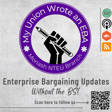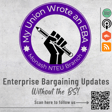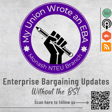Become a Creator today!Start creating today - Share your story with the world!
Start for free
00:00:00
00:00:01

Episode Three: A casual casuals chat w/ casual Scott
In this episode, Kate & Tony speak to casual academic and bargaining team member Scott about the NTEU's casual conversion and job security proposal, and the response (or lack thereof) to it from the university.
You can register for the BBQ or Mass Meeting here - https://linktr.ee/myunionwroteaneba
If you have questions about the process you'd like answered, drop us an email at myunionwroteaneba@gmail.com
You can stay up to date with everything happening with bargaining and at the branch by following us on social media:
Facebook - https://www.facebook.com/NTEUMonashBranch
Twitter - https://mobile.twitter.com/nteumonash
Transcript
Introduction to the EBA podcast
00:00:13
Speaker
G'day, everyone, and welcome to My Union Wrote an EBA. This is a podcast to chronicle the progress towards a new enterprise bargaining agreement at Monash University and is brought to you by members of the Monash branch of the NTEU. We're here to take the old agreement and hashtag change it. And unlike our namesake, my dad wrote a porno to everything we can to avoid being fucked in the process.
00:00:35
Speaker
Those involved with the podcast would like to acknowledge that it is being recorded on the unceded lands of the Kulin nations, on whose lands we live, teach and work. We would like to acknowledge and pay our respects to the traditional custodians and elders, past and present, and to the continuation of the cultural, spiritual and educational practices of Aboriginal and Torres Strait Islander peoples. Always was, always will be, Aboriginal land.
Critique on Vice-Chancellor's pay and expired agreement
00:01:02
Speaker
Good evening everyone. My name is Adam Fernandez and I'm a professional staff member at Monash University. I also happen to be one of your National Councillors at the Monash branch. It's time for another earnings update on our Vice-Chancellor's pay. Since our last bargaining meeting, our VC has made $43,342.
00:01:23
Speaker
Vice-Chancellor, when you dive head first into your room full of gold coins, do you move into freestyle or a backstroke? The people are wondering. It has been 152 days since our last agreement expired, and the university is refusing to put forward a proposal for a pay rise. That's how you tell it's embarrassingly low and out of touch with reality. Well, that's it from me for now, so have a great night and enjoy the rest of the podcast.
00:01:52
Speaker
Hi everyone.
Challenges faced by casual academics at Monash
00:01:53
Speaker
So today we're going to have a look at one of the major clauses that we're presenting to management and what their response has been. To talk us through this, we're going to be chatting with another member of our bargaining team, Scott. So Scott, can you introduce yourself and tell us how you got involved in the union? Yeah, sure Kate.
00:02:09
Speaker
casual academic at Monash. And I've been teaching in the philosophy department since 2017. And I got involved in the union kind of in the early days of the pandemic, like many casuals and have become increasingly involved ever since doing things like organizing, you know, workplace meetings in my department and writing letters and doing stalls. So Scott, you're a casual and you're on the bargaining team. How did that come about?
00:02:33
Speaker
Well, it's a bit of a funny story, actually. Kate was meant to be on the team, but because of some bizarre management policy in which they refused to pay for Kate's time, Kate sort of asked if I might be able to do it. Having a Monash contract was basically the most eligible thing about me. And I think Kate also predicted that I would take it very, very seriously and maybe even too seriously. The whole business, I think, is reflective of how university management treats casual staff. So my contract is meant to run out at the end of November.
00:03:03
Speaker
and we don't know whether they'll keep paying us or not, which is kind of very representative of our claim for job security for casuals. Thanks so much for coming to my aid with that, Scott, and I couldn't think of a better replacement, so thanks very much for that. In relation to that, why do you and we think it's so important to have a casual in that bargaining room?
00:03:25
Speaker
Yeah, so casuals face some of the worst exploitation in the university sector, I think. It's far from the only exploitation, obviously. But often provisions for all staff make exceptions for casual staff. So it's just worth having somebody who's been affected by, you know, certain decisions in the room. And I think also it's worth saying that like over 50% of the staff at the university are casuals. So it's a really big proportion of the workforce. And so it's really important that
00:03:53
Speaker
you know, there's representation there and somebody with kind of insider knowledge.
Union's conversion clause for job security
00:03:57
Speaker
So Scott, as Kate said at the top, one of the big clauses that the union is putting to the uni in the bargaining is this conversion clause to try and get people out of insecure work. Can you tell us a little bit about the clause and what it entails? Sure, Tony. So the basics of the clause are, and this has been through ongoing consultation with casuals,
00:04:19
Speaker
Um, is for like 80% of the workforce to be ongoing by the end of the agreement. So we're basically asking for drastically improved conversion rights for casuals who do a lot of the work for the university. And they do it consistently, you know, with regular hours and teaching the same units year and semester by semester. And we're arguing for conversion, better conversion rights for all staff, including academic and professional staff.
00:04:47
Speaker
and the academic jobs are graded to increase the research load as the job goes on. So it will give young and early career researchers a chance to develop an academic record. Yeah, absolutely. And hoping as well to get those people that have been casual for 10 years
00:05:07
Speaker
or for a really long time to sort of build up their research profile as well, which is another really good thing that we think that our clause does as well. And I think the other thing maybe to mention with that clause, if I'm right, Scott, is that it's about casual stuff, of course, but it's also about those stuff on fixed-term short contracts as well.
00:05:26
Speaker
Yeah, that's right, Kate. And I think in the meeting with management, one of the arguments that we were making was not only that this would clearly benefit all staff, so casual, fixed-term and ongoing staff, like we think it would just be a great benefit to the university as a whole. The culture would change, people would be insecure jobs, right? We could reduce workloads through this kind of measure as well because the work would be better distributed.
00:05:52
Speaker
So we just think it's got like so much going for it. And so it was a bit disappointing to hear management kind of express some doubt about it. Yeah, absolutely, Scott. And I was in the room as well. And I was wondering if you could elaborate a little bit more on their response and how you felt about that.
00:06:08
Speaker
because I was there, I was surprised at how shit it was. You know, they've said they've been working on this since April and really haven't had anything to show us as of yet. And if you could elaborate on that Scott, that'd be great. Yeah, I think they seem to be surprised by the ambition of the claim, which we think is, is itself surprising, given that job security is one of the things they're looking out for. And in fact, in a recent email,
00:06:36
Speaker
from Margaret Gardner, we heard I think a mention of job security is an important thing. It's in a lot of their documents that, you know, something they should be looking out for, but they clearly don't have their eye on the kind of people who need jobs and the kind of jobs that people actually want. Their solutions are kind of subpar, things like periodic employment and increasing fixed term employment, which is just another version of insecure employment.
00:07:01
Speaker
So our claim was partly modelled off a win at Western Sydney University, which was arguing for a similar right to conversion. And our numbers are roughly proportional to the comparative sizes between Western Sydney University and Monash. So we don't think it should be that surprising that we're asking for a larger number of jobs. But management was obviously a bit taken aback by that.
00:07:29
Speaker
I didn't think, one thing that I just think people don't really even necessarily realize is just how many casual and fixed term staff there are at Monash. So the university has a total of just under 10,000 staff and five and a half thousand of those nearly are either fixed term or casual. So it's above 56% of the total staff at Monash are in insecure work, which is something that it would be hard for management to not be aware of.
00:07:56
Speaker
So Scott, we've got you here today and we've got Kate as well who were both in the last bargaining meeting and obviously Scott, you've been in all of them so far. Can you give people an idea of what the actual meetings are like? Like what does the day of the meeting look like? What does it look like when you're actually in the room with these people?
Bargaining meetings: Management's stalling tactics
00:08:14
Speaker
Sure. Yeah. So bargaining days generally start with the union team caucusing and discussing our strategy for the day. So we go over, you know, maybe management sent us some clauses. So we'll talk about those and we'll run through, you know, what we're going to say and who's going to pick up the, the lead on some of those topics.
00:08:34
Speaker
We then go into the room and sit down across a very long, bizarrely long table with a group of HR people and consultants. And we try to argue for better conditions for all the workers. And they try to argue that the university should be more like a business. And it's a bit of a to and fro.
00:08:52
Speaker
throughout the day and everyone gets really tired and a bit bored. And at this point in bargaining with Monash, we're just at the point of presenting our clauses. So not a lot is being agreed on. Yeah, for sure, Scott. And I think the thing that I was really, really shocked about was how good university management are.
00:09:14
Speaker
about making things, you know, stretching things out, making things take a really long time and really, you know, trying to stretch out that bargaining process and wear us all down in the meeting room. They really like to get bogged down on details and our claims are really strong and ambitious. And so the thing that they like to do is talk about a single sentence in, you know, this big claim just to avoid having to take a position on it.
00:09:42
Speaker
Yeah, and provide very little detail in return. We keep asking them when they're going to give us some numbers on wage increases because they've said that that's a really important thing for them and they're still refusing to do so, which is really frustrating.
00:09:59
Speaker
So like you said, Scott, that at this stage, we're just presenting clauses. And I was going to ask whether that means that we sort of like all the clauses get presented. And then there's like a second run through where they actually get fought over or whether the fighting sort of happens as it goes, which was as much a question out of my own ignorance. Yeah, it's more like we present them and then they say no. And then we take industrial action.
00:10:26
Speaker
That's it. I like it. I really like the simplicity. That's what it feels like. And the other thing I think a lot of people probably assume about the bargaining team is that they're in the room with big decision makers like Margaret Gardner, or at least some of the higher people in university management.
00:10:46
Speaker
But I was surprised to see that wasn't the case, is it, Scott? Not really. I mean, they might be high up in HR, but one of the strange things about bargaining meetings is that the people we're talking to rarely have actual experience of academic research or teaching work. They're people like consultants who, you know, get paid too much money by the hour.
00:11:07
Speaker
to sit down and talk to us. So they're consultants and they're HR or what Manash likes to call workplace relations. And one of their favourite things to say is that they need to confer with somebody else before they can give us a proper answer.
The power of collective action over negotiation
00:11:20
Speaker
The obvious questions like, as you were saying, Kate, when are they going to offer us a salary increase? Yeah, for sure. And with the consultants, the longer the process goes on, the more they get paid as well.
00:11:32
Speaker
So the people that you're in the room with empowered to make any actual decisions? Look, to be honest, it's a bit murky. One thing that I will say on this is that it would be great if the people in the room were able to say yes every now and then. Yes to things like job security and reduced workloads to all staff and conversion rights for casuals. It would also be nice to feel like they wanted the best for the university rather than just making money and profits. So whether or not they
00:11:59
Speaker
actually make decisions. I think the most important thing is that they start saying yes to the things that the union is arguing for. And the only other question we had for you, Scott, was what impact does this have on the bargaining team then? Wouldn't it be better or easier for the negotiations to be able to happen in the room rather than this constant back and forth?
00:12:18
Speaker
I think there's an interesting question, Kate. I think the reality is that the real power from bargaining comes from members and comes from what goes on outside of the room. And people can get in a little bit in their heads about making the best argument in the room. Kate knows that I like to invoke Aristotle in bargaining meetings. But actually, that doesn't budge them, surprisingly. They're not that moved by fancy academic arguments for highest ethical standards.
00:12:47
Speaker
What they care about is money and what they care about is power. And the way that the union gets those things is by signing up members, talking to members and their members taking actions when necessary. Yeah, absolutely. Thanks so much, Scott, for coming and having a chat to us and taking time out of your busy bargaining schedule. And thanks for fighting for insecure employees at Monash University
Future podcast episodes and union events
00:13:13
Speaker
as well. Thanks, Kate and Tony.
00:13:15
Speaker
Hey comrades, while I have you, I just wanted to take the opportunity to quickly plug a few things. The first is that we'll be dropping our first bonus episode of the podcast very soon. It's a companion episode to this one where Kate and I chat to Gavin from Western Sydney University about a recent bargaining success story with their casual conversion clause.
00:13:32
Speaker
I think it can sometimes be easy to become a bit frustrated with what seems to be shaping up as management strategy in the bargaining room of never giving any concrete answers or alternatives to the proposals that we put forward. You'll have seen this again in this week's meeting if you've read the most recent bargaining update email and that kind of thing, frankly, should piss everybody off. It certainly pisses me off.
00:13:52
Speaker
But wins are possible. Big wins. And this is the case in point for that. These types of wins are what we are all fighting for, not just for casuals, but across the board for professional staff and academic staff, too. The second thing to plug is the end of year barbecue happening this Thursday, the 1st of December. It's on the Clayton campus from 12 to 2 in the grassy area between the Matheson Library and the Robert Blackwood Hall.
00:14:16
Speaker
If you're unsure, look for the big purple flags. Bring your mates. How? Bring your whole work area. Just remember to register at the link in the show notes so Soph knows how many snags to buy. Last but definitely not least is the mass meeting next Wednesday, December 7th. It's at midday on Zoom and it's really important to come along.
00:14:34
Speaker
We'll be giving an update on how the bargaining is going so far and discussing next steps for the campaign in 2023, including the possibility of industrial action, something we're already cooking up a podcast on to help explain. The registration link for that is in the show notes, too. I'll see you there. That's it for this episode. Thanks to Kate, Danny, Adam, Bernard and Pod Daddy Sophia for all the work they've put into this and we'll catch you next time.
00:15:02
Speaker
What?


